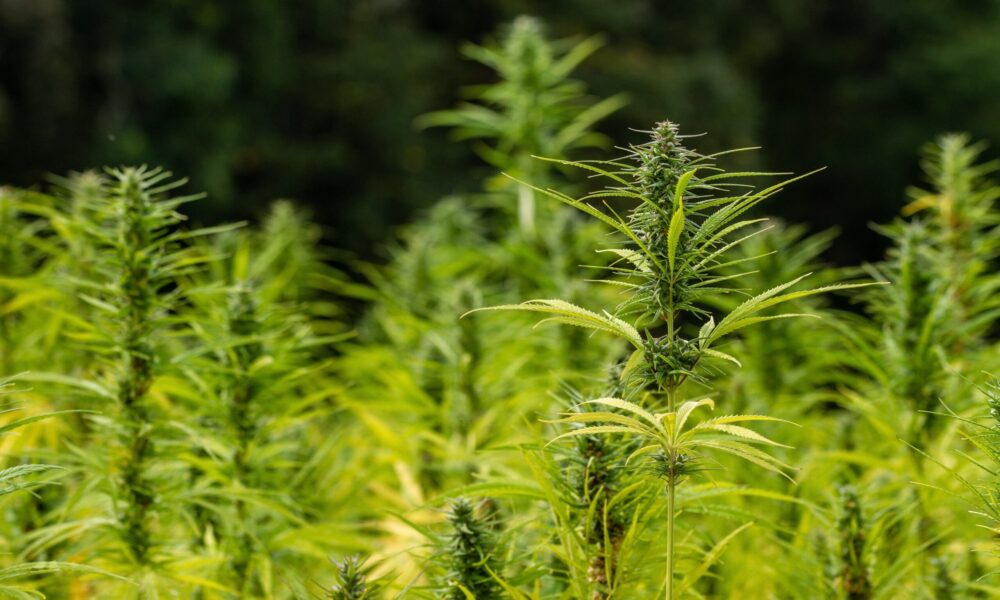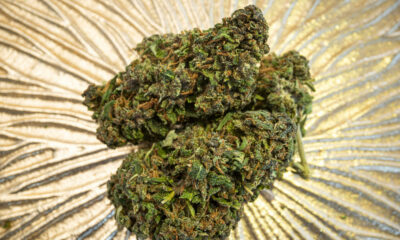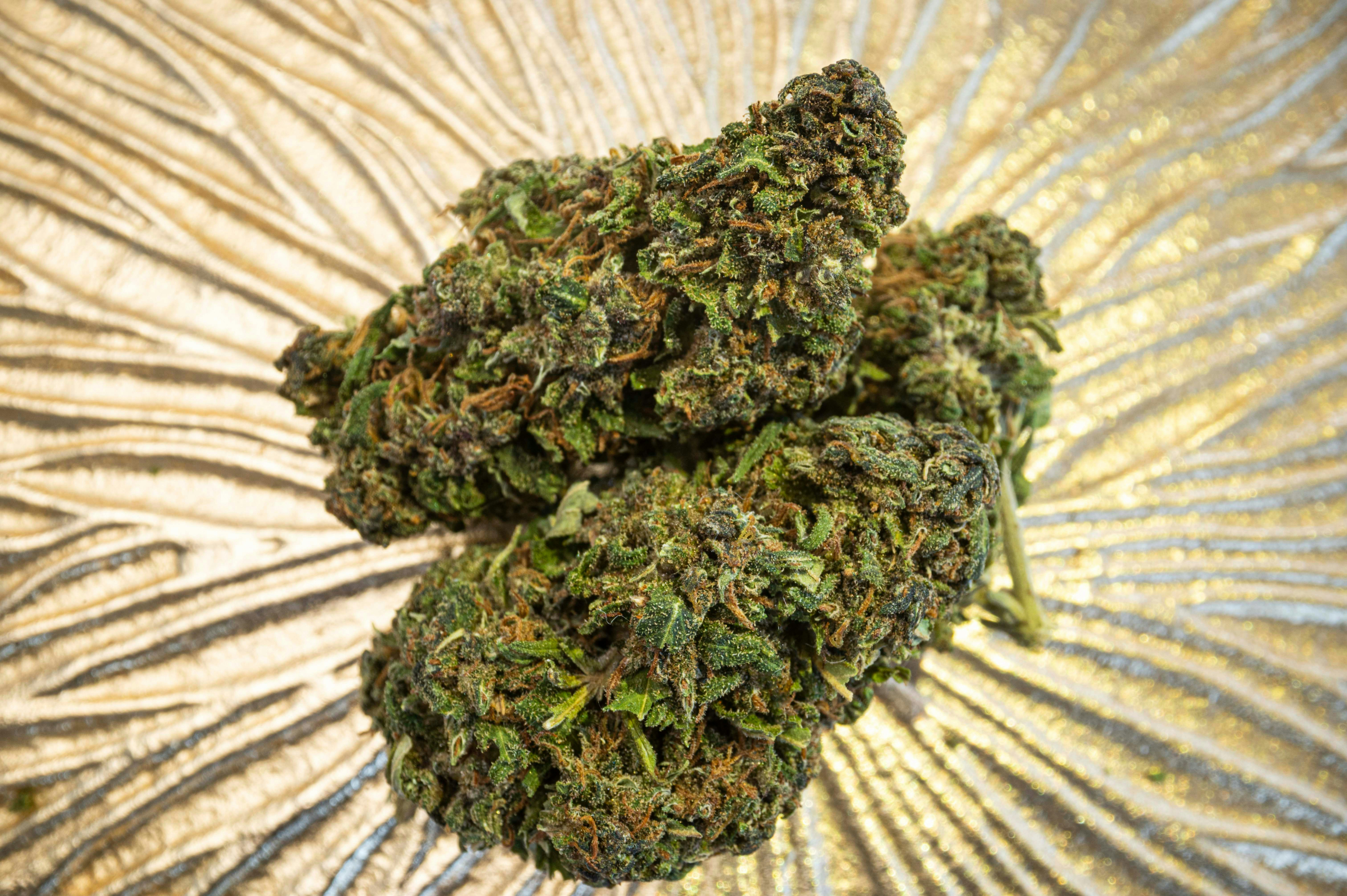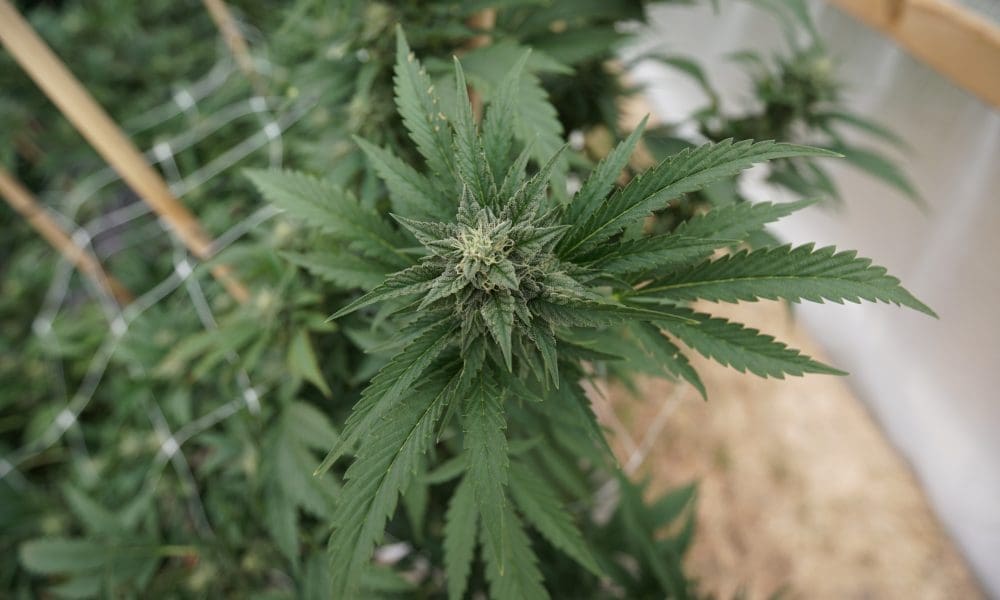featured
Regulating Intoxicating Hemp Products Is A ‘Priority,’ Illinois Lawmaker Says
Published
11 hours agoon

“We want regulations to protect consumers and weed out bad actors, but we don’t want to see this thing regulated to death.”
By Isabella Schoonover, Simon Carr and Medill Illinois News Bureau, Capitol News Illinois
Justin and Anna Ward of Stoney Branch Farms were anxiously awaiting action on legislation to regulate intoxicating hemp products this spring in Illinois, which would have determined the future of their family-run hemp business in Rushville. But it never came.
Hemp farming has been legal and regulated in Illinois since 2018, when lawmakers passed the Industrial Hemp Act following federal action that legalized hemp production. The legislation anticipated it would again be used to make industrial products, but also for the production of CBD oils that can be extracted from the plant and are marketed as having therapeutic, but not intoxicating, properties.
But hemp has since become the subject of heated debate in Illinois and other states as the plant has been increasingly used to create synthetic products with intoxicating compounds that are not regulated by the federal government. Those products, known as delta-8 THC, are permissible due to what some describe as a “loophole” in the 2018 Farm Bill that legalized hemp production.
Gov. JB Pritzker (D) has been a vocal opponent of intoxicating hemp, saying it undercuts the state’s legal cannabis industry and puts children and teens in harm’s way. He’s advocated—thus far to no avail—for regulating intoxicating hemp products similarly to the state’s legalized cannabis industry.
“This regulatory gray area has created a loophole that put Illinois consumers of all ages, but particularly children, in danger while an underground market flourished—the exact opposite of what Illinois has done by regulating our cannabis industry,” Pritzker said in a December 2024 news release.
But lawmakers failed again to pass legislation regulating intoxicating hemp this year, leaving the industry in limbo until either the state acts or the federal government intervenes first. It marked the third consecutive year that a regulatory bill failed, the latest front in a legislative fight that largely pits the state’s legalized cannabis industry against its industrial hemp growers.
Hemp vs. cannabis: What’s the difference?
Both hemp and cannabis come from the same plant and contain a level of THC that can cause a high if ingested. The most important difference, however, is in the concentration of THC. Compared to cannabis, hemp has a much lower amount of naturally occurring THC.
By federal law, if a plant has a concentration of 0.3 percent THC or less by dry weight, it is legally considered hemp. If it has any more than 0.3 percent THC, it is considered cannabis.
Both substances were strictly regulated as Schedule I drugs under the federal Controlled Substances Act of 1970 until the passage of the 2018 Farm Bill, which removed hemp from the legal definition of cannabis, thus creating a fully legal hemp market.
But the Farm Bill only established a threshold for delta-9 THC, the primary cannabinoid found in cannabis. There is no explicit threshold for hemp-derived delta-8, which is created through additional chemical processing after hemp is harvested.
Unlike cannabis products containing THC, which must meet strict regulatory requirements in Illinois and other states that have legalized recreational and medical cannabis, the intoxicating hemp market is currently unregulated and lacks oversight at both the state and federal level to ensure products are responsibly produced, marketed and sold to consumers.
For example, there is no minimum age required to purchase hemp products, making it relatively easy for young consumers to access intoxicating hemp compared to cannabis.
A recent study from the University of Illinois System Institute of Government and Public Affairs released in May found credible evidence that hemp-derived THC products are intentionally marketed and readily available to teens and young adults through online sales and convenience stores.
At least 32 states have responded by passing legislation to increase regulations, or in California’s case, ban intoxicating hemp altogether.
Should it be regulated or banned?
The Wards have grown hemp on their sixth-generation farm since it was legalized in 2018. They’re in the camp that would like to see the intoxicating hemp industry more strictly regulated but not outright banned.
As president of the Illinois Healthy Alternatives Association, a trade association and lobbying group for hemp farmers, Justin Ward has made regular trips to Springfield to advocate for increased hemp regulation.
According to Ward, new regulations should include state-mandated testing to ensure hemp products are compliant with federal regulations and free of toxic contaminants, sold in child-safe packaging and labeling and have a minimum age requirement at point-of-sale.
“Everything we grow meets that standard,” Ward said. At Stoney Branch Farms, the Wards sell both non-intoxicating and intoxicating forms of hemp, including delta-8. They said the cultivation, processing, packaging and marketing of their products is all done in-house.
Every crop at Stoney Branch goes through a pre-harvest THC potency test by a federal sampling agent, in addition to a post-processing test by a third party to ensure the final products are free of contaminants. The products are then sold online in child-safe packaging to consumers 21 years old or above.
A bill to make these standards law in Illinois, House Bill 1, was proposed this year with the support of hemp lobbyists, but continued disagreement among stakeholders over the details of licensing, taxation and the legal potency threshold of delta-8 THC caused the bill to stall without being called for a vote, according to the bill’s sponsor Rep. La Shawn Ford (D-Chicago).
Municipalities are free to ban the sale of hemp-derived products as they see fit, and many have; in Chicago, the City Council has approved bans specific to some wards.
The state’s legalized cannabis industry, which saw its first sales in January 2020, has at times called for an outright ban on delta-8. The industry maintains it’s willing to work toward a solution.
Tiffany Chappell Ingram, executive director of the Cannabis Business Association of Illinois, said in a recent statement that regulations are needed to “rein in” intoxicating hemp. She argues that the hemp industry unfairly undercuts licensed cannabis operators, evades health and safety regulations and generates little revenue for state programs due to its low tax rate.
“We’ve been at this for years at this point, but we’ve got a lot of great allies in the legislature.” Ward said. “This hasn’t been banned yet because they’ve listened to us.”
Opposition from cannabis crowd
The state’s cannabis industry argues intoxicating hemp is not distinct enough from cannabis to have its own license category and far fewer barriers to entry and operation.
For example, while a three-year license for hemp only costs $1,100, including initial licensing fees, a license for cannabis costs $100,000 just to apply for a large adult-use cultivation license, then another $100,000 when the license is granted and each time it’s renewed. The state caps large-scale adult-use cultivation centers to 21 licenses, and has issued fewer than 100 smaller-scale “craft grow” licenses at a cost of $40,000.
When hemp was legalized, many who couldn’t gain entry to the cannabis industry took it as an opportunity to produce a similar product without all the red tape.
“Part of the reason we were drawn to hemp is the lower barriers of entry to get into this in comparison to the cannabis industry,” Ward said.
Hemp is also taxed at a much lower rate than cannabis, allowing the industry to price its products more competitively. Cannabis revenues, by comparison, are hurt by stricter taxation and regulatory compliance, according to the University of Illinois report.
Social equity cannabis licenses are available at lower costs to those who have been impacted by the state’s prior criminalization of cannabis, including those previously convicted of cannabis related offenses, but the industry is still far from accessible.
Ford, who spearheads the issue of hemp and cannabis regulation each year, said it’s important to balance promises made to current social equity cannabis license holders with any concessions made for hemp.
Ward said he supports easing regulations on cannabis to make the industry more accessible in Illinois, while also keeping hemp accessible through “sensible” regulations.
“We want regulations to protect consumers and weed out bad actors, but we don’t want to see this thing regulated to death,” Ward said.
Legislature divided on regulation
The state legislature hasn’t been able to settle the question of whether to regulate hemp-derived products containing delta-8 THC as distinct from medicinal and recreational cannabis, or to treat them as virtually the same substance.
The issue caused a rift among House Democrats earlier this year, and despite continued discussions during the spring legislative session, lawmakers have still not come to a consensus.
A proposal backed by Pritzker in the 2024 session, House Bill 4293, to legally define hemp as cannabis, would have made it illegal to sell hemp without a cannabis license. Hemp lobbyists strongly opposed that measure, fearing it would shut them out and give cannabis license holders a monopoly over the cannabinoid market.
Pritzker ultimately blamed House Speaker Chris Welch (D) for killing that bill in January. Despite bipartisan support, Welch said at the time the measure didn’t have enough votes within his Democratic ranks to pass. A spokesperson for Welch promised at the time that he would continue to work toward hemp regulation throughout the legislative session.
A spokesperson for the speaker declined to comment on why hemp regulations still didn’t advance. Both hemp and cannabis lobbies have donated tens of thousands of dollars to Welch’s campaign, Ford’s and others over the last several years in the legislative blitz surrounding the various regulatory bills.
Ward said Ford has been one of the hemp lobby’s biggest allies. Ford conducted meetings all session among lawmakers, the governor’s office and industry stakeholders in an effort to find common ground.
“We have two competing industries, and we already have existing businesses, and existing businesses are not interested in just losing their operations,” Ford said.
While closed-door conversations surrounding hemp regulations have continued, there has yet to be a public hearing on hemp. Rep. Sonya Harper (D-Chicago), who chairs the House agriculture committee, said the speaker had not responded to her requests for such a hearing.
“I just want to actually make sure that the voices of those most impacted are heard,” Harper said.
Likelihood of future hemp regulation
Though there’s been significant pressure from Pritzker and some advocacy groups to regulate hemp in Illinois, Ford said he’s not inclined to rush the process, arguing it needs broader bipartisan support.
“We had a problem when we regulated cannabis: We sort of rushed it, and we didn’t have stakeholders all at the table,” Ford said. “Some Republicans would say that they were not a part of it.”
A number of Republicans have recently joined negotiations over hemp legislation. But a compromise still seems far off. Rep. C.D. Davidsmeyer (R-Murrayville), who’s been leading that effort, said Republicans are unlikely to support anything but closing the intoxicating hemp loophole.
Davidsmeyer said he opposes the double standard for cannabis license holders versus hemp.
“If you’re going to have a standard, you have everybody in the same industry going by the same rules,” he said.
A spokesperson from the governor’s office said his position has not changed since he called for greater regulation.
“I think that it’s agreed that, from the speaker of the House, the governor and the Republicans and myself, and the industry, everyone agrees that we should regulate this,” Ford said. “Over the months, we should be able to get something. It’s a priority.”
Federal changes coming?
A bill that would end this hemp loophole at the federal level passed through the U.S. Senate Appropriations Committee on Thursday, July 10. If that bill becomes law, the cultivation and sale of hemp products containing “quantifiable amounts” of THC would once again be prohibited under federal law, rolling back the previous allowance of 0.3 percent.
This would deal a devastating blow to the more than $400 million U.S. hemp industry.
One of the most common forms of hemp sold in the U.S. is cannabidiol, or CBD, a non-intoxicating cannabinoid which is marketed as a therapeutic alternative for the treatment of conditions like insomnia, inflammation and seizure disorders.
“That’s a big focus of our business still, is people who are looking for some of the therapeutic benefits that cannabis can provide without a high,” Ward said.
Because CBD almost always still has trace amounts of THC, proposals to ban any “quantifiable amount” of THC could result in the prohibition of CBD products. “I think we really do a disservice to a great number of consumers in Illinois by doing that,” Ward said.
Simon Carr is a student in journalism with Northwestern University’s Medill School of Journalism, Media, Integrated Marketing Communications, and a fellow in its Medill Illinois News Bureau working in partnership with Capitol News Illinois.
Isabella Schoonover is a graduate student in journalism with Northwestern University’s Medill School of Journalism, Media, Integrated Marketing Communications, and a fellow in its Medill Illinois News Bureau working in partnership with Capitol News Illinois.
Capitol News Illinois is a nonprofit, nonpartisan news service that distributes state government coverage to hundreds of news outlets statewide. It is funded primarily by the Illinois Press Foundation and the Robert R. McCormick Foundation.
This article first appeared on Capitol News Illinois and is republished here under a Creative Commons Attribution-NoDerivatives 4.0 International License.

Author: mscannabiz.com
MScannaBIZ for all you Mississippi Cannabis News and Information.
You may like
-


Cannabis farm worker in California dies following a chaotic federal immigration raid
-


Looks Don’t Get You High. Smokeability Does.
-


Missouri Marijuana Regulators Revoke License Of Concentrate Manufacturer Involved In Massive Product Recall
-


Suspects rob Paseo District marijuana dispensary
-


Malta Limits Historic Marijuana Legalization Law, Sending Threat Letters To Consumers Over ‘Nuisance’ Odors
-


Gang uses drone to find and steal cannabis farms

In today’s cannabis scene, “premium” and “high-grade” get thrown around so casually that they’ve lost all meaning. Anything with a little frost and a decent nose is getting labeled top-shelf, no matter how it actually smokes.
That’s the problem.
When every bag is called fire, even when it burns like mids, the entire culture suffers. Consumers get duped into paying premium prices for a mediocre product. New growers lose motivation to push the limits. Standards get stuck. The real heat gets buried under hype.
Somewhere along the way, the cannabis market started prioritizing how weed looks on Instagram over how it smokes. Bag appeal, frosty pics, loud branding — all of it’s been elevated to a point where looks have overtaken experience. But looks don’t have anything to do with smokeability. Photos don’t tell you how clean the smoke is.
Here’s the reality: True quality is how it smokes. How it hits the lungs, how it burns, how it lingers. That’s the only metric that matters.
Right now? There are crews out there putting out “clean mids” that smoke better than half the overpriced, so-called premium in Mylar bags.
If this culture wants to evolve, the standard can’t be set by the lens. It’s got to be set by the lungs. Every time.
— Submitted by Walter Bridger, Mount Maunganui, NZ.
About High Thoughts: Short Hits From the Community
Welcome to High Thoughts, a new series from High Times featuring quick takes, stray thoughts, and stoned wisdom from our global cannabis community. These aren’t polished essays or sponsored posts — just real voices from real people who live this culture every day.
In this edition, Walter Bridger, a third-generation cannabis advocate from New Zealand and founder of Trap Talk, reminds us why smokeability still matters more than bag appeal. Looks don’t get you high. Lungs do.
This article is from an external, unpaid contributor. It does not represent High Times’ reporting and has not been edited for content or accuracy.
Photo by Chiara David on Unsplash

Author: mscannabiz.com
MScannaBIZ for all you Mississippi Cannabis News and Information.
featured
Missouri Marijuana Regulators Revoke License Of Concentrate Manufacturer Involved In Massive Product Recall
Published
5 hours agoon
July 20, 2025
“The department enforces its regulations to uphold the Missouri Constitution and ensure safe access to marijuana product at our licensed facilities.”
By Rebecca Rivas, Missouri Independent
A Springfield marijuana manufacturer central to Missouri’s largest cannabis product recall last year had its license revoked Thursday.
State regulators found the company, C&C Manufacturing LLC, created a distillate—or THC concentrate that produces a high in edibles and vape pens—using unregulated THC.
Other manufacturers statewide bought the distillate and used it to make numerous brands of vapes, edibles or pre-rolled joints, including Rove, Zen and Packarillos. A total of 135,000 products were recalled last year.
After the state issued the company a notice of pending revocation in January, regulators discovered C&C had “removed or destroyed all of the marijuana product in its facility as well as its video records,” according to the Missouri Division of Cannabis Regulation’s Thursday press release announcing the revocation.
“C&C’s use of unregulated THC to create marijuana products, numerous violations of rule, and destruction of product and records in direct violation of DCR orders demonstrates clear disregard for law at the expense of health and safety and has no place in Missouri’s regulated market,” said Amy Moore, the division’s director.
Matt Cummins, CEO of GOAT Extracts, is listed as the designated contact for the facility and a number of GOAT products are on the list. The Independent reached out to the designated contact number listed on the state’s facility database for comment and did not receive a response.
Some of the unregulated THC involved using “chemical modification,” the release states. That could mean C&C bought a THC concentrate that had been made by converting hemp-derived CBD into THC using a chemical conversion process. Then the company used that to make its distillate, a process that had been used in another major recall case involving the company Delta Extraction.
The recall time frame is quite wide. It goes back to last year when companies were trying to ramp up for recreational marijuana sales.
Nick Rinella, CEO of Hippos Cannabis, told The Independent last year that his company unknowingly bought some of C&C’s distillate in 2023 when Hippos’ own supply was low at its grow and manufacturing facilities.
But he emphasized that this recall is not because of lack of testing. Once Rinella and other manufacturers got the distillate and made products with it, those were “properly tested” before they went on the shelves, he said.
“We can feel confident that those products were safe,” he said last August. “They passed all the tests, and we have some of the most stringent tests in the country.”
During the recall announcement last year, the division said no adverse reactions involving recalled products have been reported.
The division’s Thursday release states that the violations leading to C&C’s license revocation are “numerous.”
It states the company violated state and federal law by transporting Missouri marijuana outside of the state. C&C also sold marijuana products in Missouri that did not originate from Missouri marijuana and “failed to preserve records and marijuana products as directed by DCR’s prior directives.”
“The department enforces its regulations to uphold the Missouri Constitution,” Moore said, “and ensure safe access to marijuana product at our licensed facilities.”

Author: mscannabiz.com
MScannaBIZ for all you Mississippi Cannabis News and Information.
featured
Malta Limits Historic Marijuana Legalization Law, Sending Threat Letters To Consumers Over ‘Nuisance’ Odors
Published
9 hours agoon
July 20, 2025
“We’re back to punishing plants and people instead of fixing the real problems, which are housing density, social stigma and lack of safe venues.”
By Felipe Neis Araujo, Filter
In late 2021, Malta became the first European country to legalize marijuana possession for adult use. Anyone over 18 could keep up to seven grams on their person and up to 50 grams at home, plus grow up to four plants. The act also established a regulatory framework that included cultivation and distribution by licensed nonprofits known as Cannabis Harm Reduction Associations (CHRAs).
Portugal and other countries had decriminalized personal possession, but it was still a civil violation. Malta’s reform was praised as a pragmatic, public health‑oriented pivot that would siphon revenue away from drug-trafficking groups and spare people the burden of a criminal-legal record. Public consumption remained banned, but people could smoke cannabis at home.
Four years later, the island nation’s governing Labour Party has changed its tune.
In May, the Parliament of Malta unanimously approved Bill 128, which sets a €235 fine for public consumption of non-medical cannabis—including “in any place where the [odor] causes a nuisance to third parties.”
Previously this had only applied to public consumption, but it now includes people smoking in the privacy of their home—if a neighbor complains about the smell. A free hotline has been set up to receive complaints. In July, warning letters began to arrive.
“A lot of people were smoking on their balconies and annoying people who lived above them,” Joey Reno Vella, the executive chairperson of the Authority for the Responsible Use of Cannabis (ARUC), told the Times of Malta earlier in 2025.
The law states that no “criminal proceedings…shall be taken except at the request or with the authorization of the Authority on the Responsible Use of Cannabis.” But it becomes a court matter if the fine goes unpaid—and then what? As time goes on, how will ARUC handle people who are fined repeatedly and cannot pay?
“We’re back to punishing plants and people instead of fixing the real problems, which are housing density, social stigma and lack of safe venues,” Maltese activist and former ARUC employee Karen Mamo told Filter at an academic drug policy conference in June. CHRA have been forbidden from operating on‑site lounges.
The policy U‑turn did not come out of nowhere. Policing remained part of legalization from Day One, targeting young people who smoked outside. Police officers pounced on those using cannabis on beaches or rooftops. Conservative lobbyists and the Catholic Church spread a narrative about Malta becoming the new Amsterdam.
In 2023, House of Representatives Deputy Speaker Claudette Pace told members of Parliament that she’d met a visually impaired man whose guide dog had gotten high from second-hand smoke. In 2024, the government launched a high-profile Responsible Cannabis Use campaign. Warnings about the fine for smoking in public or near minors appeared on billboards and Instagram posts.
The message was clear: Cannabis is still a threat to children and public order. These tired tropes ignore the fact that adults can drink alcohol and smoke cigarettes while holding a a child in their lap, and apparently not pose the same risk.
In the island’s densely populated apartment blocks, the issue of odor complaints emerged as a way to effectively roll back the 2021 protections.
In 2011, Malta saw an historic cannabis criminalization protest led by David Caruana, who was facing charges for growing cannabis plants on his balcony; cultivation was considered to be drug trafficking, even in personal-use quantities. Advocates highlighted the case of Daniel Holmes and Barry Lee, who in 2006 had been arrested for growing five plants. Lee died by suicide while awaiting trial; Holmes was serving a 10.5-year sentence. He was released in 2018.
NGOs such as ReLeaf Malta rallied public support and pushed politicians to imagine something better. This lobbying gained traction after 2015’s Drug Dependence Act nominally decriminalized personal possession, but left police free to detain users for 48 hours. Advocates fighting against piecemeal reform finally prevailed in 2021.
The new amendments will fall hardest on tenants who cannot control communal airflow and on working‑class youth who smoke cannabis outside because landlords ban indoor use. Cultivating the four permitted plants anywhere other than at home now comes with a fine of up to €1,000, yet the plants cannot be visible outdoors. Such fines may not deter affluent growers with detached homes and gardens, but may bankrupt someone renting a third‑floor walk‑up in Birkirkara.
The new law could easily clog the courts, with every contested fine becoming a quasi‑forensic dispute over whose nostrils caught what and when. And, perhaps most galling, the new law imposes mandatory data-sharing on CHRAs—they must hand over their membership lists to ARUC, sowing fear over how that information will be used.
Malta once offered reformers across Europe a glimpse of what nationwide legalization might look like outside the Americas. Yet Malta’s rapid reversal shows how fragile reform can be and that legalization is a process, not a finish line.
This article was originally published by Filter, an online magazine covering drug use, drug policy and human rights through a harm reduction lens. Follow Filter on Bluesky, X or Facebook, and sign up for its newsletter.
Photo courtesy of Chris Wallis // Side Pocket Images.

Author: mscannabiz.com
MScannaBIZ for all you Mississippi Cannabis News and Information.

Cannabis farm worker in California dies following a chaotic federal immigration raid

Looks Don’t Get You High. Smokeability Does.

Missouri Marijuana Regulators Revoke License Of Concentrate Manufacturer Involved In Massive Product Recall

Suspects rob Paseo District marijuana dispensary

Malta Limits Historic Marijuana Legalization Law, Sending Threat Letters To Consumers Over ‘Nuisance’ Odors

Gang uses drone to find and steal cannabis farms

THE LAST DAYS OF LEGAL CANNABIS (1990)

Regulating Intoxicating Hemp Products Is A ‘Priority,’ Illinois Lawmaker Says

A Totally Incomplete List Of The Top Cannabis Accounts And Creators To Follow On Social Media
Words Of Gratitude From The Heart Of Bennett Production

Wisconsin’s Biggest City Adopts Rules Limiting Sales Of THC-Infused Hemp Products To Adults 21 And Older

Mom, Apple Pie & Cocaine (1979)

Military Veteran Sues Feds, Claiming He Was Wrongly Detained After Immigration Raid At California Marijuana Farm

Kids caught smoking weed, vapes in videos; Augusta woman sought for questioning

Silk Road Operator Pardoned By Trump Makes Case For Legalizing All Drugs To Mitigate Harms Of Prohibition—Even If It’s ‘Not Necessarily What You Want To Hear’

Czech Republic President Signs Bill To Legalize Marijuana Home Cultivation And Allow Psilocybin For Medical Use

Senate Sets Initial Vote On Trump’s Pick To Lead DEA Next Week As Marijuana Rescheduling Sits In Limbo
High Times Greats: Hunter S. Thompson

Minnesota City Launches Government-Branded Cannabis Gummy—And It Wants Residents To Pick The Product’s Name

Over 100 pounds of cannabis seized during Oakland traffic stop

Gen Z Increasing Alcohol Intake Without Cutting Cannabis

Illegal marijuana grow worth $3M busted in Hacienda Heights, deputies say

Beat the heat with a Bong Island Iced Tea

‘Not Waiting on Broken Systems to Deliver’

Alert: Department of Cannabis Control updates data dashboards with full data for 2023

Connecticut Appoints The US’s First Cannabis Ombudsperson – Yes there is a pun in there and I’m Sure Erin Kirk Is Going To Hear It More Than Once!

5 best CBD creams of 2024 by Leafly

EU initiative begins bid to open access to psychedelic therapies

Free delta-9 gummies from Bay Smokes
New Study Analyzes the Effects of THCV, CBD on Weight Loss

Mississippi city official pleads guilty to selling fake CBD products

May 2024 Leafly HighLight: Pink Runtz strain

5 best autoflower seed banks of 2024 by Leafly

Curaleaf Start Process Of Getting Their Claws Into The UK’s National Health System – With Former MP (Resigned Today 30/5/24) As The Front Man

Discover New York’s dankest cannabis brands [September 2024]

Horn Lake denies cannabis dispensary request to allow sale of drug paraphernalia and Sunday sales | News

Local medical cannabis dispensary reacts to MSDH pulling Rapid Analytics License – WLBT

Press Release: CANNRA Calls for Farm Bill to Clarify Existing State Authority to Regulate Hemp Products

Nevada CCB to Accept Applications for Cannabis Establishments in White Pine County – “Only one cultivation and one production license will be awarded in White Pine County”

5 best THC drinks of 2024 by Leafly

6 best CBD gummies of 2024 by Leafly

The Daily Hit: October 2, 2024

5 best delta-9 THC gummies of 2024 by Leafly

Weekly Update: Monday, May 13, 2024 including, New Guide for Renewals & May Board meeting application deadline

People In This State Googled ‘Medical Marijuana’ The Most, Study Shows

Thailand: Pro-cannabis advocates rally ahead of the government’s plan to recriminalize the plant

PRESS RELEASE : Justice Department Submits Proposed Regulation to Reschedule Marijuana

Press Release: May 9, STIIIZY and Healing Urban Barrios hosted an Expungement Clinic & Second Chance Resource Fair
Trending
-

 California Cannabis Updates1 year ago
California Cannabis Updates1 year agoAlert: Department of Cannabis Control updates data dashboards with full data for 2023
-

 Breaking News1 year ago
Breaking News1 year agoConnecticut Appoints The US’s First Cannabis Ombudsperson – Yes there is a pun in there and I’m Sure Erin Kirk Is Going To Hear It More Than Once!
-

 best list12 months ago
best list12 months ago5 best CBD creams of 2024 by Leafly
-

 Business10 months ago
Business10 months agoEU initiative begins bid to open access to psychedelic therapies
-

 Bay Smokes1 year ago
Bay Smokes1 year agoFree delta-9 gummies from Bay Smokes
-

 cbd1 year ago
cbd1 year agoNew Study Analyzes the Effects of THCV, CBD on Weight Loss
-

 Mississippi Cannabis News1 year ago
Mississippi Cannabis News1 year agoMississippi city official pleads guilty to selling fake CBD products
-

 California1 year ago
California1 year agoMay 2024 Leafly HighLight: Pink Runtz strain

